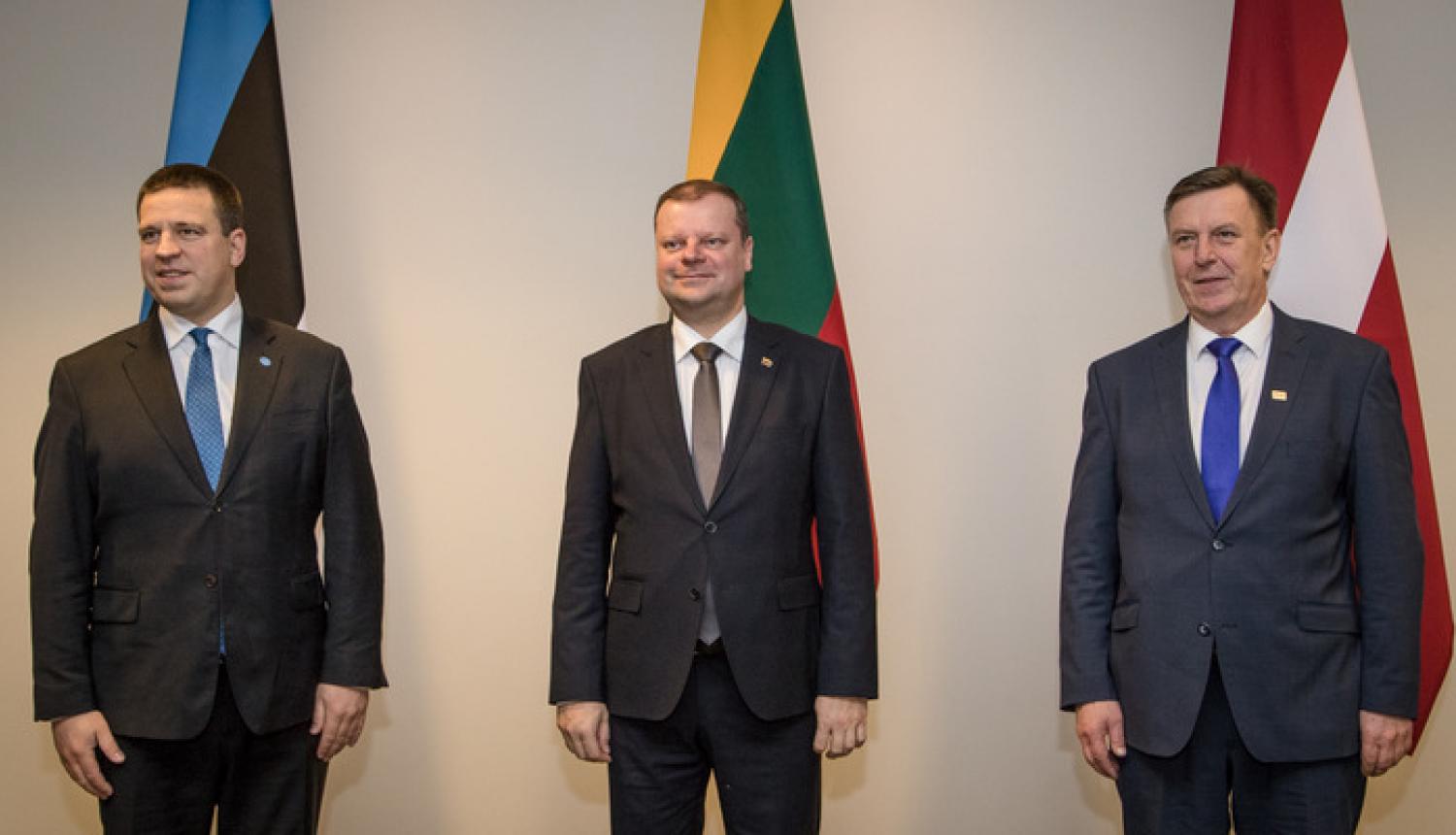On Monday 17 December, the Prime Minister Māris Kučinskis attended the meeting of the Baltic Council of Ministers (BCM) in Vilnius.
During the meeting, Latvian Prime Minister M. Kučinskis, Estonian Prime Minister Jüri Ratas and Lithuanian Prime Minister Saulius Skvernelis discussed security, the European Union (EU) multi-annual financial framework 2021-2027 and the Rail Baltica project.
Addressing the issues related to the security, M. Kučinskis pointed out that the Baltic States, by reacting to the current security situation and contributing to the collective security, have consistently moved towards the increase of the defence budget and have reached 2% of the gross domestic product (GDP) for defence. In order to ensure the strengthening of the defence capability of the country and the implementation of the NATO’s defence expenditure guidelines, Latvia will soon complete the first year of spending 2% of the GDP on defence.
“I appreciate that our three defence ministers are determined to try and increase the funding even more.”
Latvia supports the European Union’s necessity to play a greater role in guaranteeing defence and security.
“We have to co-operate as much as possible, so we can submit joint Baltic States projects. It is also important to support the interests of our defence industry. At the same time, we are reluctant about the idea to create the European army and the EU Security Council. In my opinion, these proposals are not yet fully defined and, at first, should be discussed between all EU Member States.”
He underscored that the main collective defence organisation in Europe is the NATO, which the EU efforts have to complement and strengthen. It is in Latvia’s interests to maintain the transatlantic alliance and the close co-operation with the United States and Canada. The NATO’s enhanced presence battle group has promoted the deterrence and defence policy of the alliance. The solidarity between the alliance and the allied countries and the preparedness to strengthen the security of the Baltic States are greatly appreciated.
Similarly, he notes the necessity to strengthen the cyber security. The Baltic States’ co-operation on cyber security, which was already strengthened in the Memorandum of Co-operation of 2015, and the successful exchange of information and good practice at expert level are sustaining the Baltic States’ shared vision on the current cyber security threats and their prevention. It is important to continue active co-operation by sharing the information on major incidents, coordinating the vision on issues of the cyber security policy and ensuring the cyber security resilience together with the EU partner countries and the NATO allies.
While discussing the EU multi-annual financial framework, M. Kučinskis pointed out that the Baltic States can work together to ensure that the final agreement on the funding of the cohesion policy takes into account the specific needs of our countries. It is also important that in the following period the alignment of direct payments to farmers in the Member States with the same production costs is finished.
Whereas, talking about the railway project Rail Baltica, the Prime Minister underscored that this is the biggest and most important railway infrastructure project in the region. At the same time, it is a symbol of the Baltic unity, thus, a mutually concerted activity and close co-operation with the EU institutions are necessary to achieve the desired result.
“We can be pleased with the progress of the Rail Baltica project, because this year the work on railway tracks and territorial plan is about to be finished and the next phase of the project – the development of the technical design – has been initiated. However, we have a great responsibility ahead of us. We must continue to work proactively in order to ensure greater EU co-funding for the Rail Baltica project in the next EU financial framework. Next year, we also plan to decide on the infrastructure management model for the Rail Baltica project. This model has to be as effective and economically efficient as possible in order to give the best performance for the investments made and to save taxpayers’ money.”
He considered that, during the new financial programming period, it would be necessary to strengthen the overall EU competitiveness in the field of research. It is important to include the integration criteria in the programme Horizon Europe. It is important that the scientists from smaller and less well-developed countries have the access to the projects implemented by the large consortia.
Next year, Latvia will take over the BCM presidency from Lithuania and our priorities will be the strengthening of the regional security, the development of connectivity of the region and the protection of interests of the Baltic States in the EU. The expected instability of the security situation obliges us to continue the work on strengthening the regional security, by increasing the defence budgets of the Baltic States, developing the joint and synchronized capacities, carrying out joint procurements, as well as evolving the current co-operation projects. Including, working in the areas of the strengthening of the NATO’s capability for deterrence and defence and successful implementation of the decisions made. In relation to the development of connectivity of the region – we must continue to work on the implementation of the Rail Baltica project, the development project on the synchronization of the electricity networks and regional gas market, as well on the gradual introduction of the Via Baltica 5G networks. Similarly, we have to continue to protect the interests of the Baltic States in the EU multi-annual financial framework discussions in order to ensure sufficient funding for the Connecting Europe Facility instrument, which is used to fund the Rail Baltica project.
Andrejs Vaivars
Press Secretary to the Prime Minister
Phone: 29228678
E-mail: Andrejs.Vaivars@mk.gov.lv



